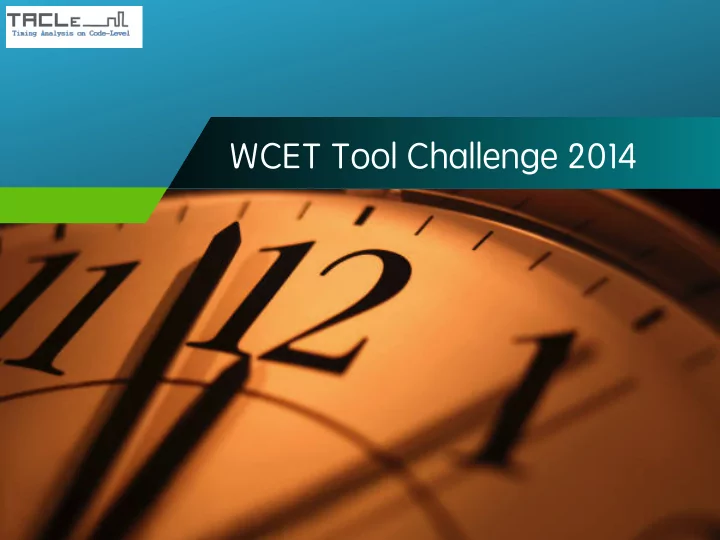

WCET Tool Challenge 2014
Outline 1. Objectives of the challenge 2. Benchmarks and problems 3. Participants 4. State of progress / next?
Objectives § a set of benchmarks and problems to: o compare the properties of different WCET tools § what is the state of the art? § friendly competition, no winner! o improve benchmarks and collect new ones o foster cooperation among tools http://www.mrtc.mdh.se/projects/WTC/ ¡
Kinds of problems § Flow analysis and expression o loop bound? § Low-level analysis o path is infeasible? and WCET o input annotations? computation o WCET of a function? o number of cache misses on the worst- case path?
Benchmarks § debie1 o software of a satellite instrument for measuring impacts of small space debris or micro-meteoroids o now publicly available (thanks to Niklas Hoslti) o ported to Java by B. Huber/W. Puffitsch § papabench o open-source software of an UAV o two communicating programs: autopilot and fbw o ported to Java by M. Malohlava § heli o software (student projet) for a helicopter model
Benchmarks (2) § tcas o traffic collision avoidance software o used by the software verification community § safety properties/requirements § matmul o matrix multiplication o intended to exercise cache analysis § coop o synthetic benchmark designed to foster tool cooperation
Benchmarks (3) infeasible cache benchmark loop bounds annotations WCET paths analysis debie1 15 22 22 papabench 4 11 9 14 heli 1 1 3 2 3 tcas 3 5 matmul 3 2 coop 2 2 1 1
Targets (processors) § Basic processor o 1 instruction = 1 cycle § ARM7 o 3-stage pipeline, 10-cycle memory latency § ARM9 o 5-stage pipeline, instruction and data caches, 10-cycle memory latency § MPC5554 o 4-way unified cache o partitioned cache: 1 way for instructions, 1 way for data § List is open!
Participants so far § T-CREST (TU Denmark & TU Vienna) o M. Schoeberl, A. Jordan, S. Hepp, B. Huber, W. Puffitsch § gaZ RT toolset (U. of Zaragosa) o J. Segarra § TUBound (TU Vienna) o J. Zwirchmayr § oRange (U. of Toulouse) o A. Bonenfant, J. Zwirchmayr § OTAWA (U. of Toulouse) o H. Cassé, C. Rochange
T-CREST § Time-predictable Multi-Core Architecture for Embedded Systems § Processor Patmos § Network-on-chip § Memory controller and arbitration tree § WCET optimizing compiler § WCET analysis with platin/aiT
Patmos § Time-predictable processor § In-order RISC § Static dual-issue for some performance § Special caches and on-chip memory o Method cache o Stack cache o Data cache + bypass
T-CREST Compiler – WCET Toolflow
T-CREST and WTC § Demonstrate integration compiler and static analysis § Disclaimers o Platin (especially its flowfact handling) is under development o Our numbers (results) can change from every change in our toolchain § WCET toolchain available open source (except for aiT) § Our modifications of the WTC benchmarks § Our test drivers are available o [1] https://github.com/t-crest/
Status § Focus on new benchmarks: Heli, TCAS, Coop § Results of compilation and analysis need to be validated (this takes time) § In our case, programs require indeterminism to be interesting o prevent compiler optimizations or trivial analysis) § We made some modifications (TCAS still needs more) o shared our feedback with the WTC organizers
Early Conclusions § Well-described set of WCET analysis problems o New benchmark programs (yay!) o Still need few modifications though § What we learned about our own tools so far o Platin can't handle certain CFGs o Platin lacks output of some useful analysis information o We got ideas on extending Platin's capabilities
TUBound
oRange § Static analysis tool of C programs based on abstract interpretation o input: § C file(s) § some domain values § branch choices § partial analysis o output § loop bounds § some infeasible paths (related to loop increment variables) § critical unbalanced conditionals § compatible with OTAWA § partial analysis
OTAWA
State of progress (oRange+OTAWA) § Flow analysis/annotation o all problems have been tackled § some of them could not be solved o exploitation of ‘infeasible path’ annotations should be improved § Low-level analysis/WCET computation o preliminary results for basic processor, ARM7, ARM9 o next step: MPC5554 target
Plans for next weeks/months § New participants are still welcome o submitting results is permanently possible § Additional problems & benchmarks o cache locking, flow analysis on binary code o lift controlling software § A report paper will be written within 2-3 months with participants o discussion on tools, strong and weak points o discussion on benchmarks o unsolved problems
Recommend
More recommend